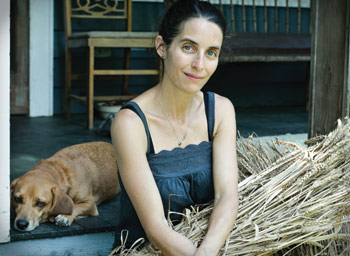Artisan bread lovers take note: The long-fought effort to provide grow and mill hard wheat for discerning area bakers has resulted in the creation of a hybrid company that puts the love of organic flour on an equal footing with the need to earn a profit.
Jennifer Lapidus’ multiyear effort recently resulted in registering Carolina Ground as a North Carolina “L3C” company, according to a recent blog post on the North Carolina Organic Bread Flour Project’s website.

Here’s how Lapidus describes the company: “An L3C is a sort of hybrid between an LLC and a 501 C-3, in other words, it is a mission-driven for-profit business; it’s also know as a “low-profit” company. Carolina Ground, L3C will be structured as a bakers’ owned co-op mill, but incorporated as an L3C. Because what we hope to accomplish with this mill is to enable the farmer to get the best possible price for his/her grain at an affordable cost to the baker—to exist outside the commodities market—it is our stakeholders—the farmer and the baker—that we want to see thrive, not necessarily the mill; although we need the mill to do well, exist in the black, provide jobs, ect… The L3C felt like the perfect fit for us and I think it is going to conjure a lot of dialogue (hopefully) about the way we do business—a triple bottom line approach (with economic, social, and ecological value) whose ecological and social value are the direct benefits of keeping it local.”
The inspiration for the project came in the wake of skyrocketing wheat prices in 2008. Lapidus began to sample locally grown varieties of wheat — which were the results of the USDA-ARS Uniform Bread Wheat Trials headed by Dr. David Marshall, research leader of the Plant Science Research Unit in Raleigh. The purpose of the USDA-ARS trials was to identify and breed bread wheat (hard wheat) for production in the eastern United States. Trials began in 2002 and, five years later, resulted in the release of the first of its varieties to the public.
“I had a couple of different varieties sent to my bakery through channels that I was already working with as a baker, and the results were a lot more decent than any of us had expected,” Lapidus says. Thus, the first kernel of inspiration: Good wheat, it seemed, could be grown in North Carolina.
Then, Carolina Farm Stewardship Association (CFSA) contacted Ms. Lapidus. The association had heard about her initial efforts to organize bakers and they wanted to see this project get off the ground. With CFSA’s backing, the parties pursued funding, and the North Carolina Bread Flour Project — as an initiative of CFSA — was launched by way of a two-year grant from the North Carolina Tobacco Trust Fund Commission and Sante Fe Tobacco.
— Photo by Hazen Hunter Photography.




Is this a viable alternative to tobacco as a cash crop? Can a farmer make enough money to survive on 8 to 10 acres? Is the season long enough in the mountains to grow wheat?
[b]Is this a viable alternative to tobacco as a cash crop?[/b]
Is it supposed to be a straight trade off?
[b]Can a farmer make enough money to survive on 8 to 10 acres?[/b]
As opposed to… what? lettuce?
[b]Is the season long enough in the mountains to grow wheat? [/b]
yes.